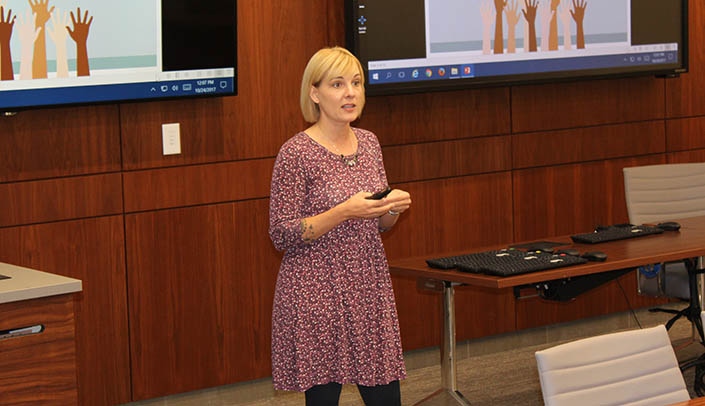For many of us, it’s nearly impossible to imagine the challenges refugees around the world have endured.
According to Alana Schriver, refugee specialist for Omaha Public Schools, the average time spent in a refugee camp is 20 years. Around the world, some 20 million people have obtained status as a refugee, but when you consider the number of people forcibly displaced, the number skyrockets to 65 million.
Schriver hosted a talk on Oct. 24 at the Fred & Pamela Buffett Cancer Center to offer insight on the struggles refugees have overcome and continue to face as they resettle in the U.S. The talk was hosted by Nebraska Medicine’s clinical nurse educators to help health care workers understand the different cultures of the many refugees and their differing perception of health care as a whole.
“We may see all the things a refugee gains by moving to America,” Schriver said. “But what we don’t consider is what they’re giving up. Most refugees want to go home.”
Schriver explained many refugees know very little about the United States and may see a picture of the New York City skyline and think that’s what America is. She noted that there is no diversity inside refugee camps and no access to the outside world.
“To arrive at the United States and see many different types of people – it can be overwhelming,” she said.
When encountering a resettled refugee in a health care setting, there are many cultural things to keep in mind. Shriver mentioned:
- As health care providers working with schedules, it’s important to understand cultural perspectives of time. Some cultures believe being on time is rude.
- In trying to discern body language of refugee patients in lieu of spoken language, we may perceive lack of eye contact as a sign of disinterest. However, some cultures believe eye contact is threatening or rude. Looking down is a show of respect.
- Health care providers value patients asking questions. However, some cultures are taught to never question a doctor.
Schriver said health professionals may enjoy more success with these types of patients by trying to understand and adapt to the patient instead of expecting them to adapt. Many value traditional healing and are skeptical of technology and Western medicine.
Heeding the call
At the January Health Equity Symposium, there was a call to action to provide equitable care to our patients. Watch UNMC Today for more information on events like this one.
“Illness is seen as external forces causing an imbalance, not because of germs,” Schriver said. “If you can, work their philosophy of traditional healing into their care plan.”
Refugees also do not prioritize preventative care and managing chronic illness, as many have never had this type of care in their previous settlement areas.
“If a medication won’t cure an illness, they believe this is who they’re meant to be,” she said.
Successful interaction
A few tips Schriver offered regarding interacting with a resettled refugee:
- Utilize Interpretive Services for language barriers. Reassure patients they are not charged for this service. This allows a professional to clarify questions instead of a family member interpreting.
- Talk to the patient, not the interpreter.
- Don’t ask yes or no questions.
- Check for understanding by asking the patient to repeat back the recommendations.
The Refugee Health Collaborative offers an expansive list of resources for working with refugees. This group meets on the third Tuesday of each month. For more information, contact Schriver at 531-299-9580.
Nebraska Medicine also offers CultureVision, which is another great resource. If you’re interested in learning more about Nebraska Medicine and UNMC’s Heath Equity Workgroup, contact Kay Grant, program coordinator, Office of Health Professions Education, at 402-559-9742.
